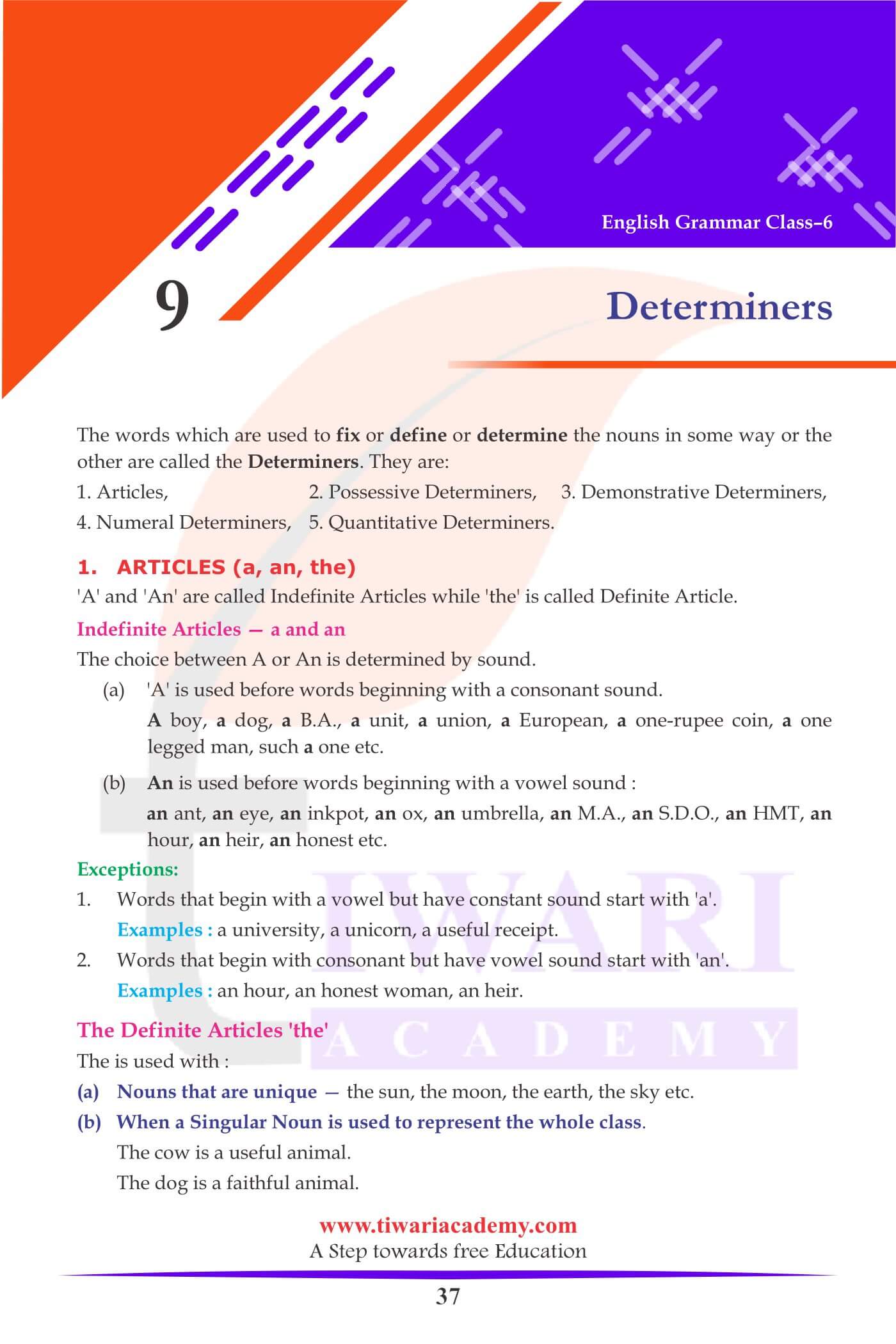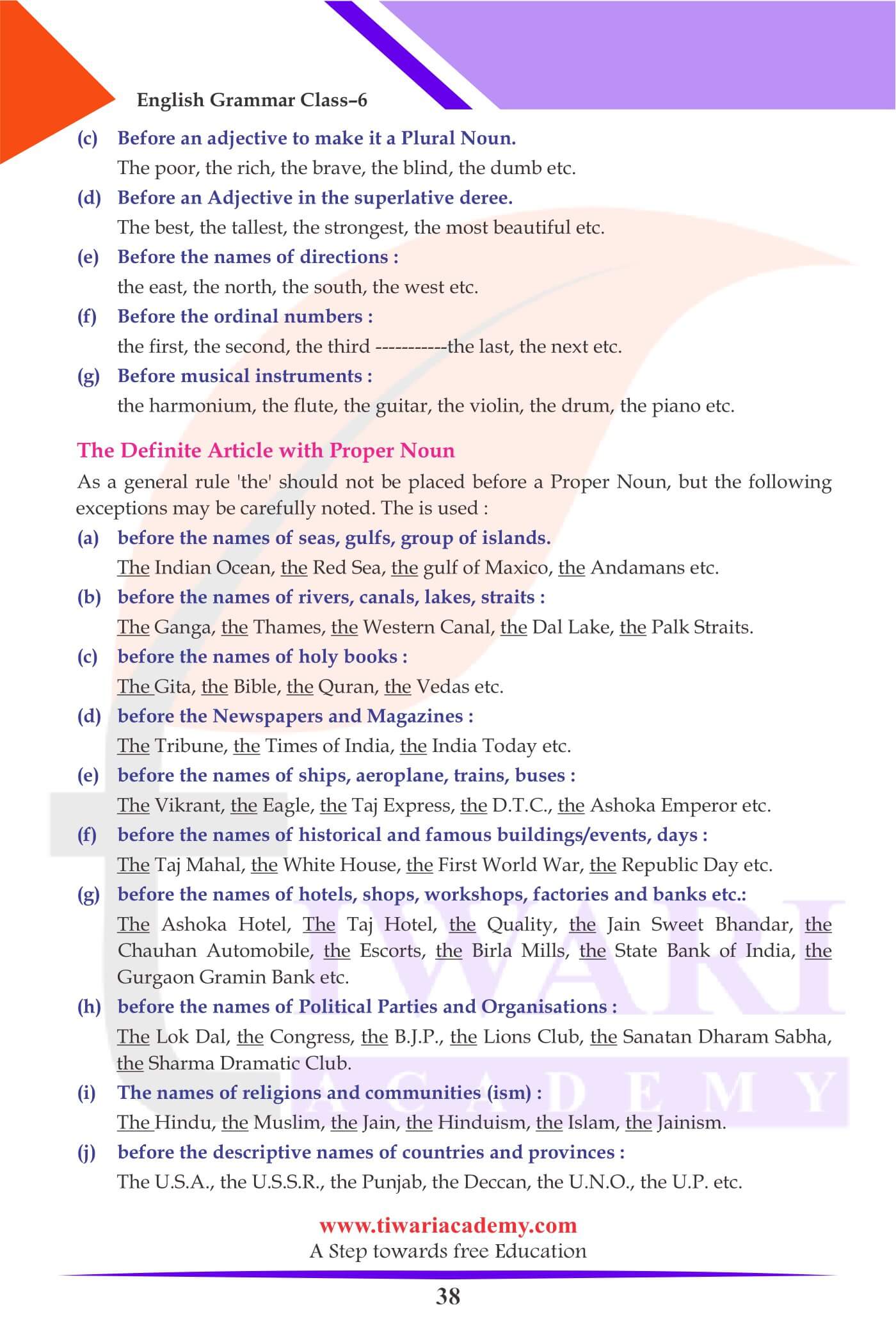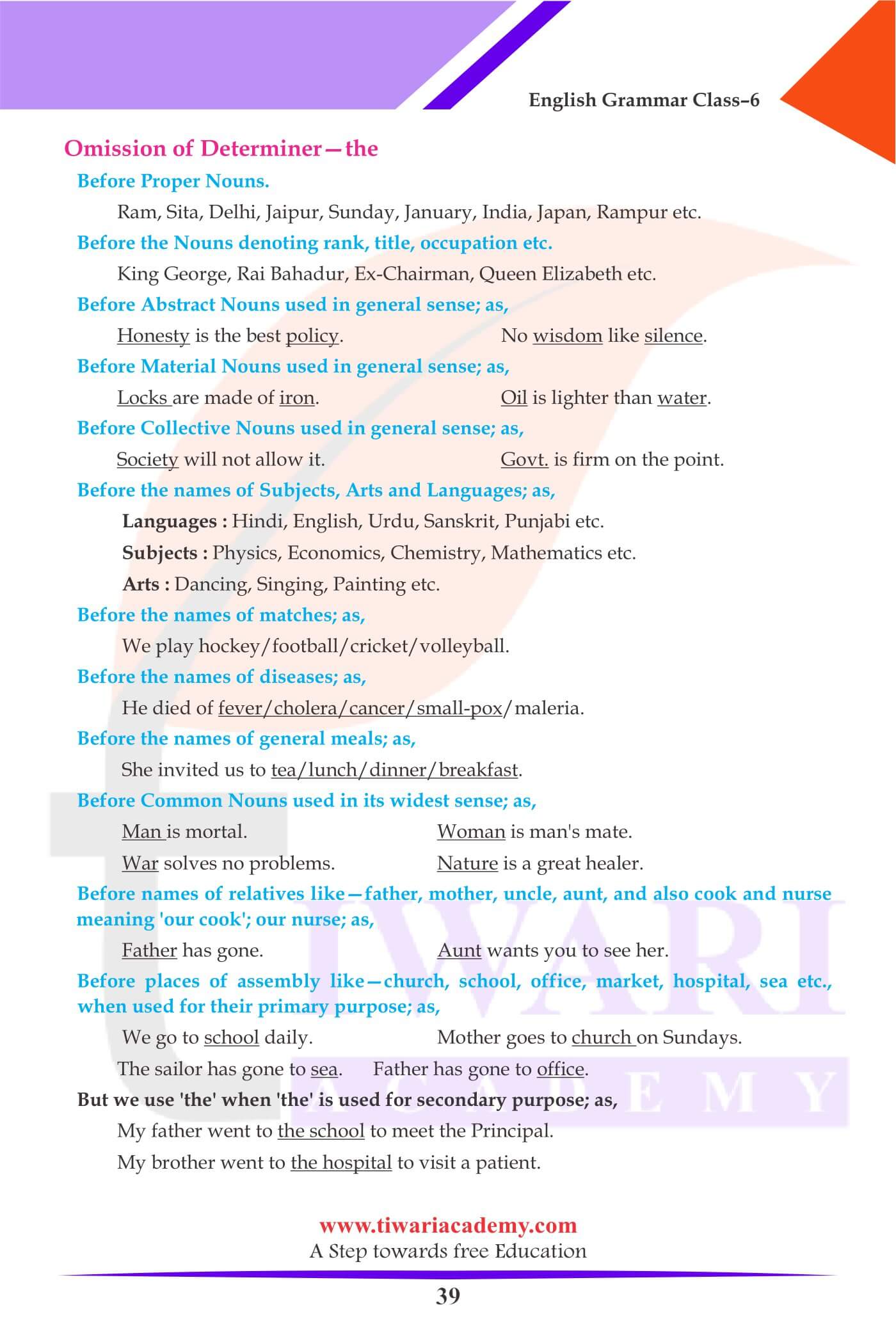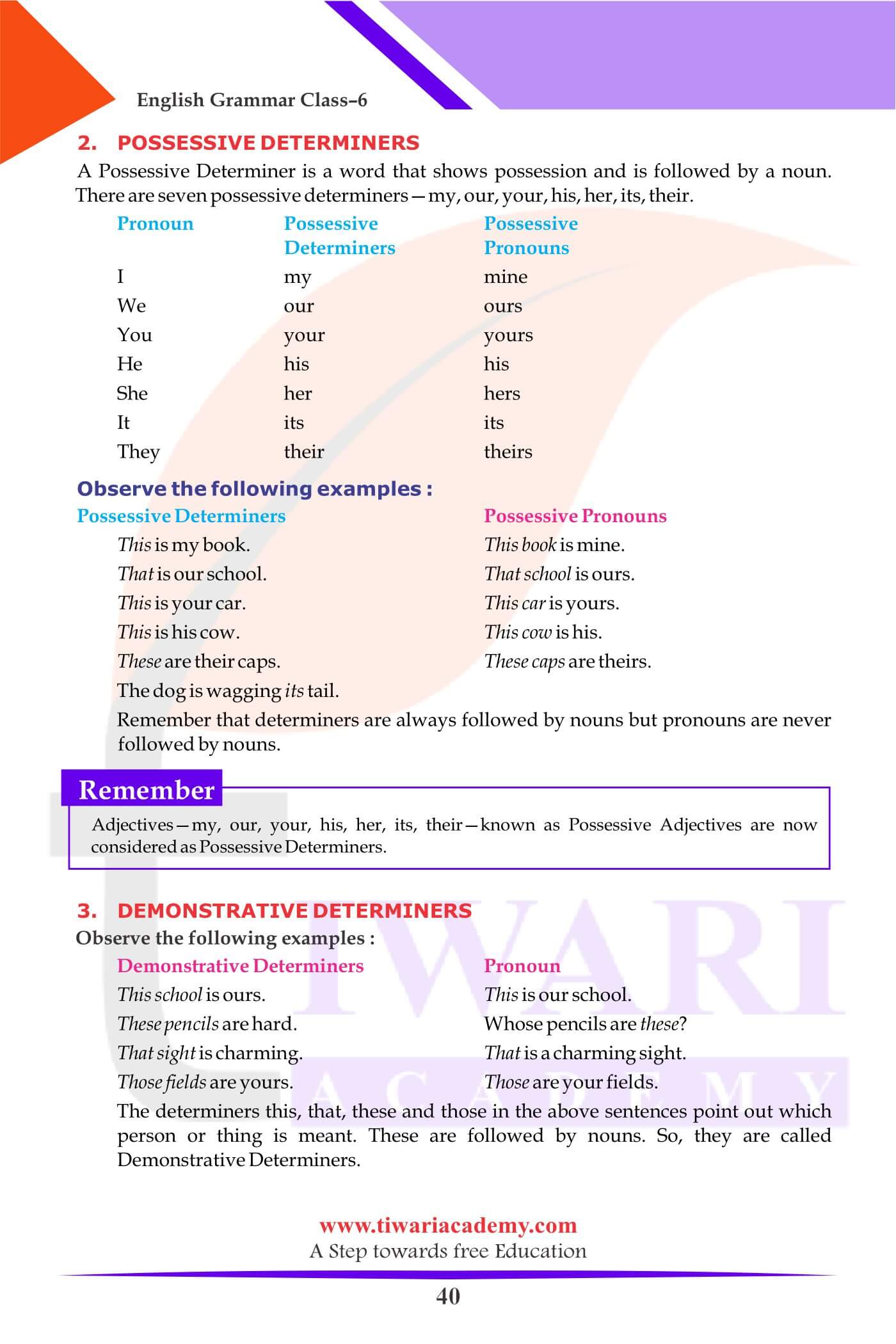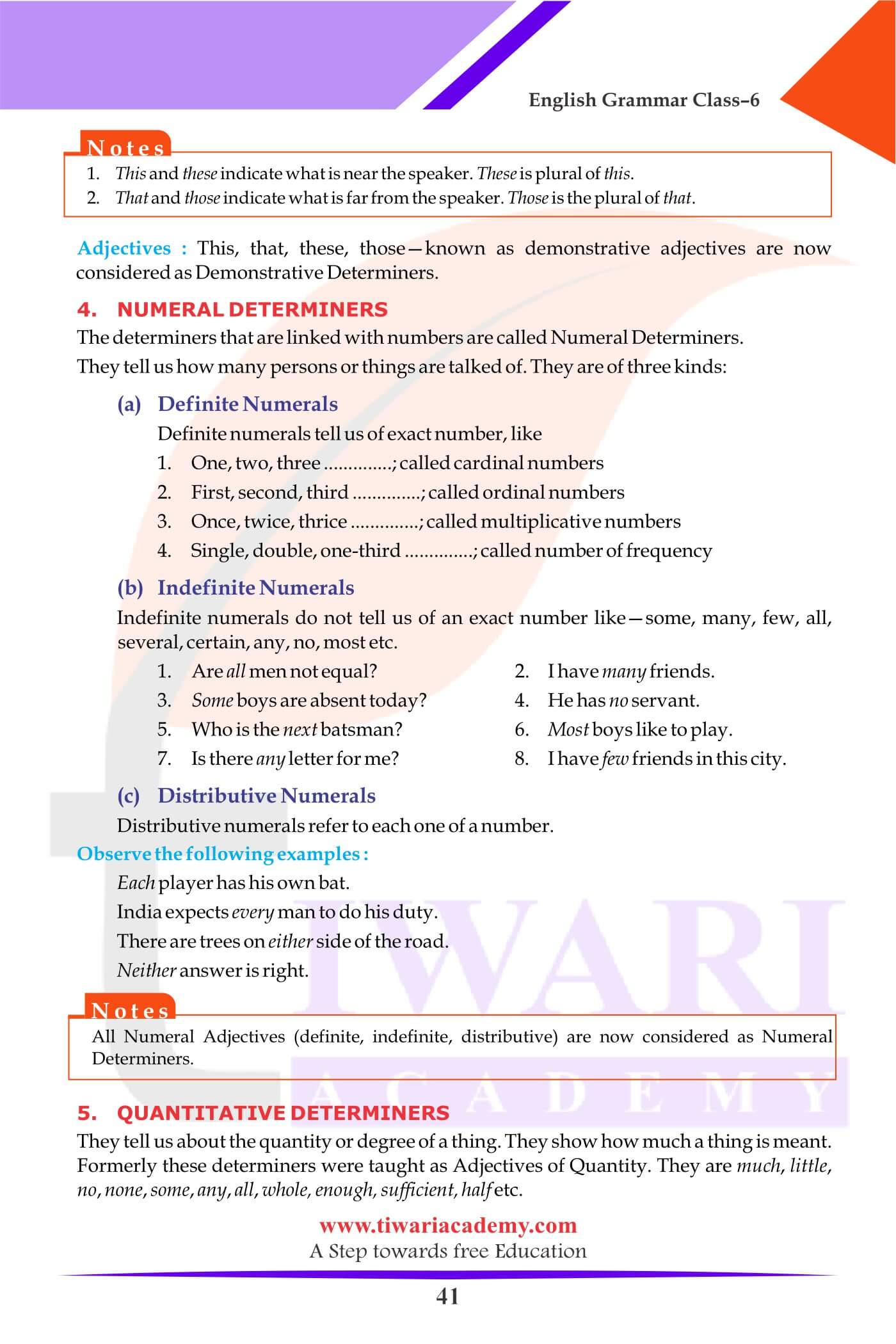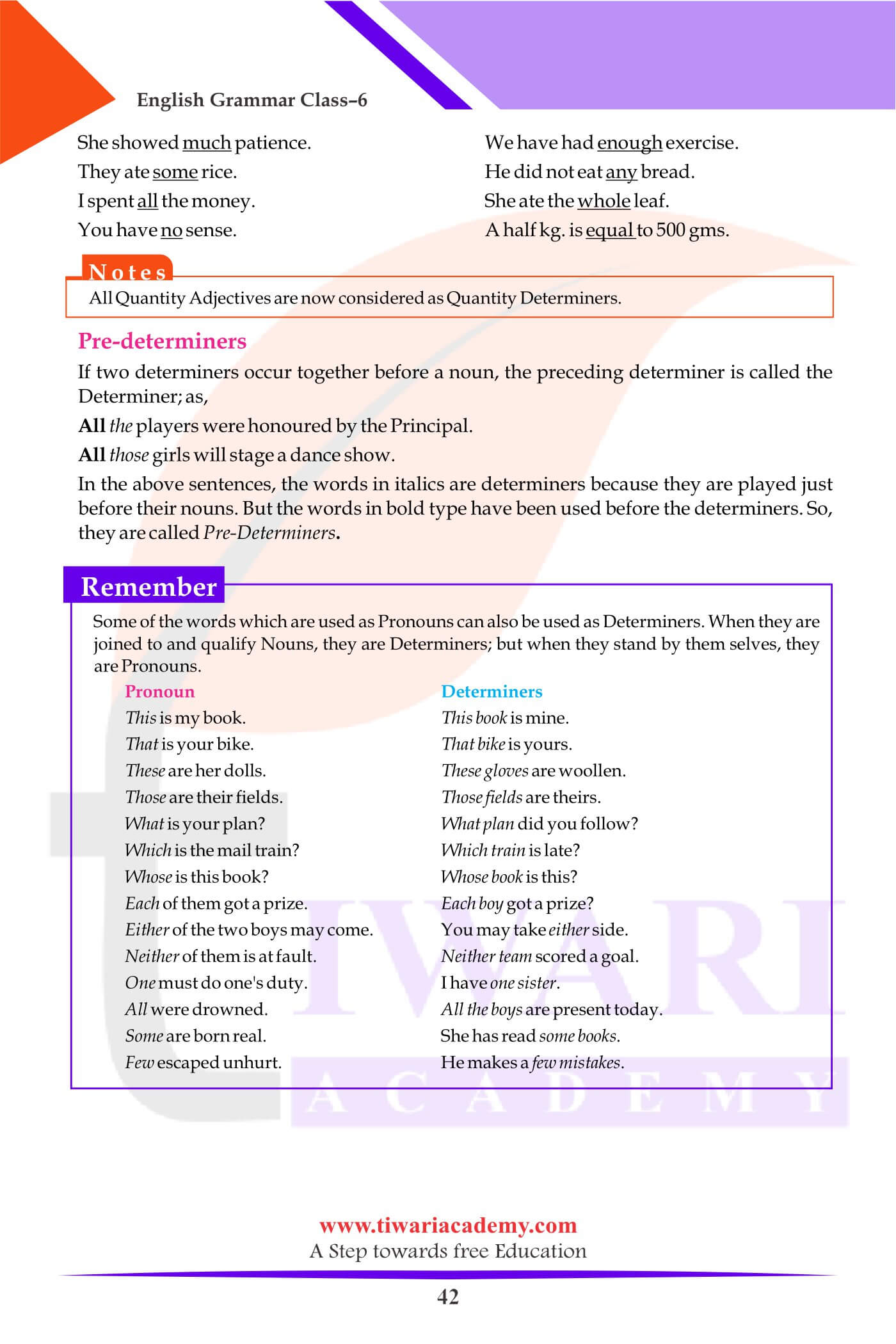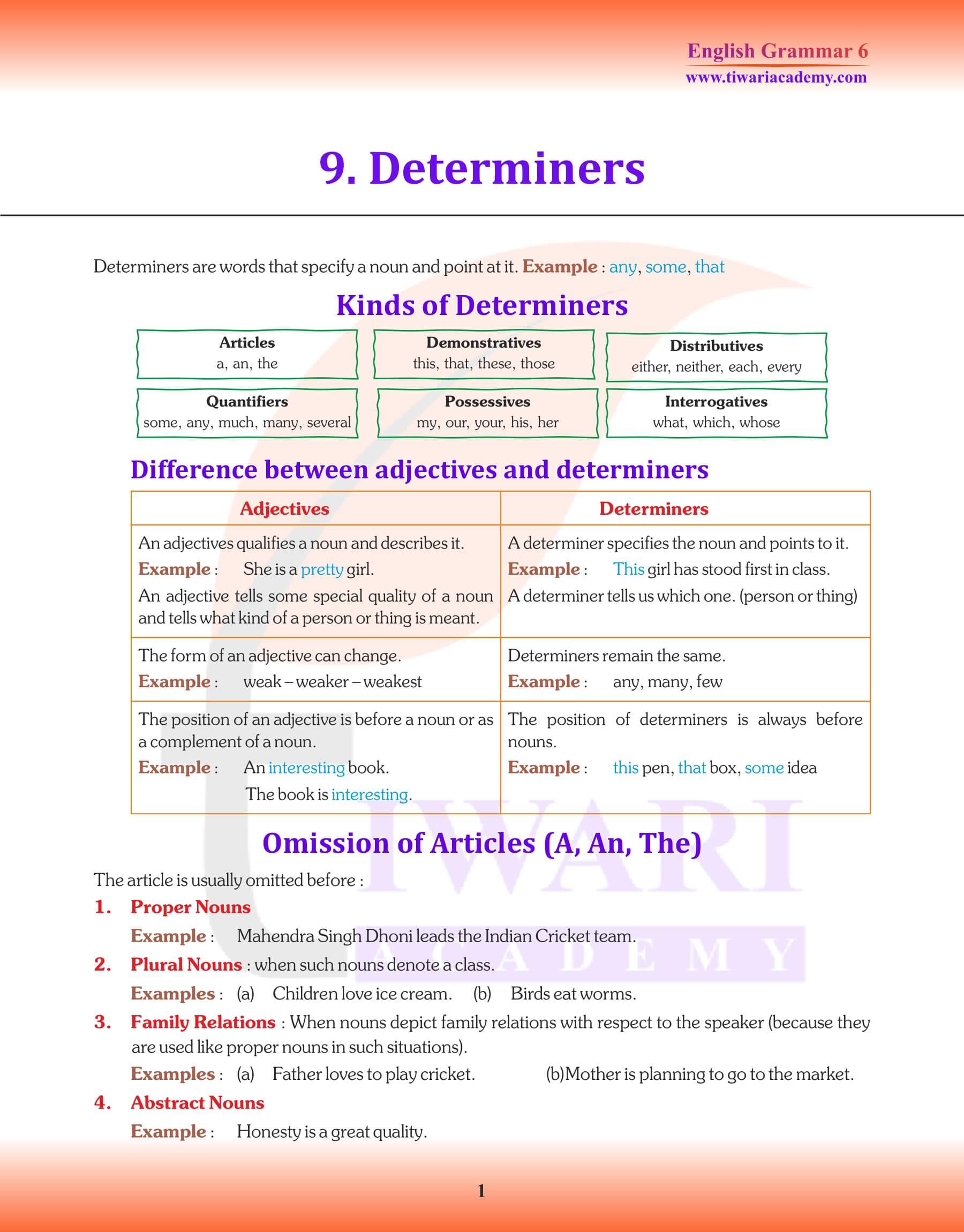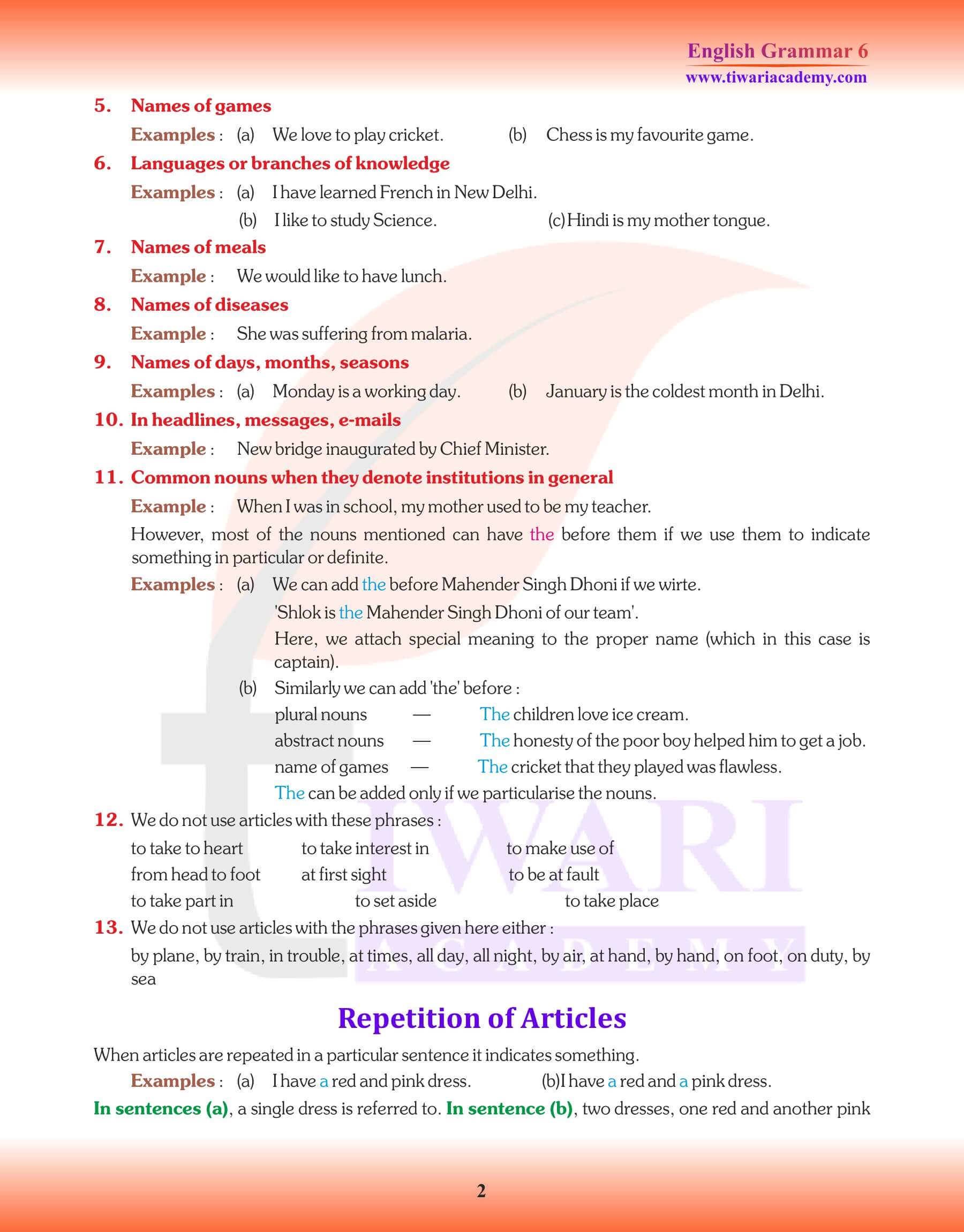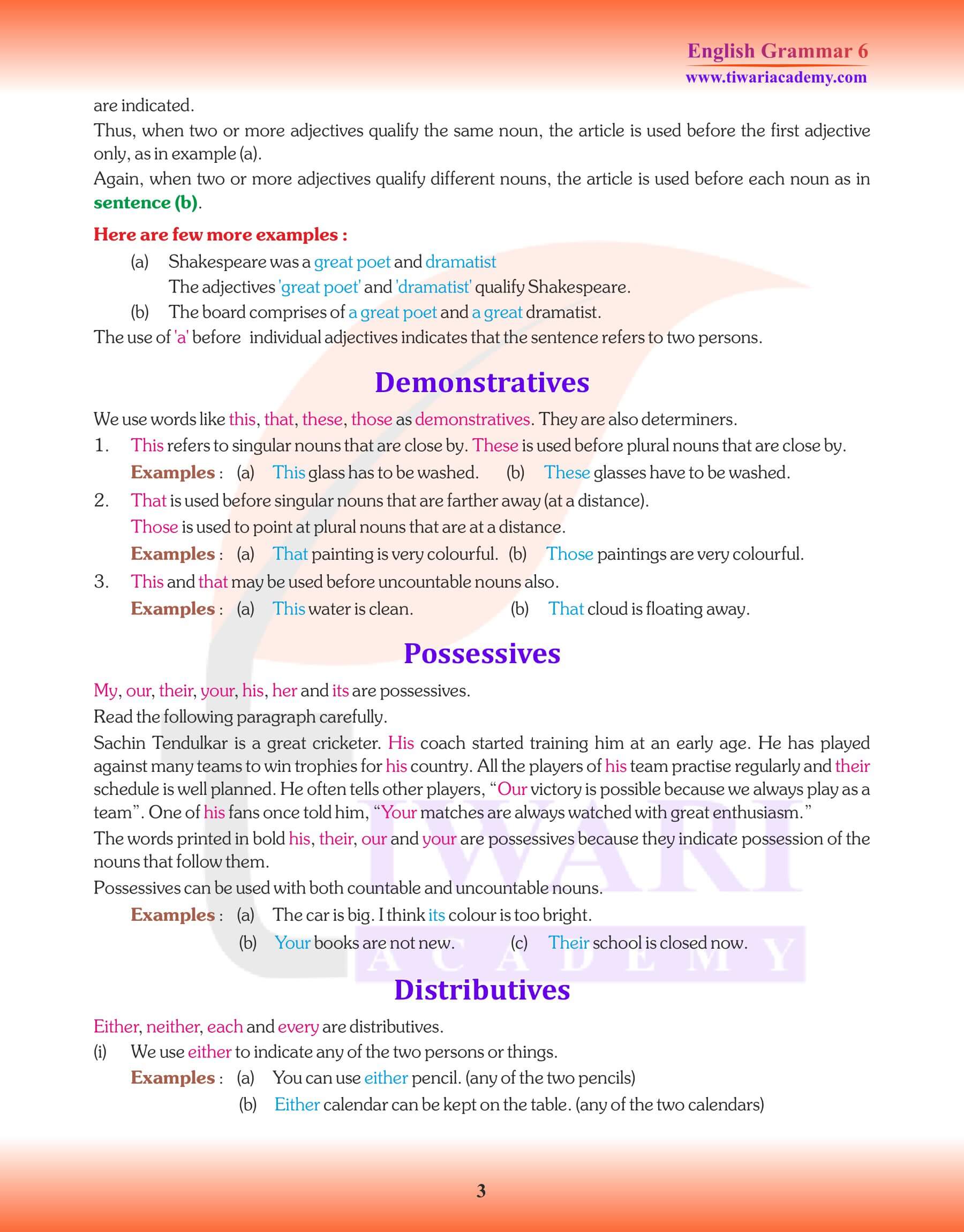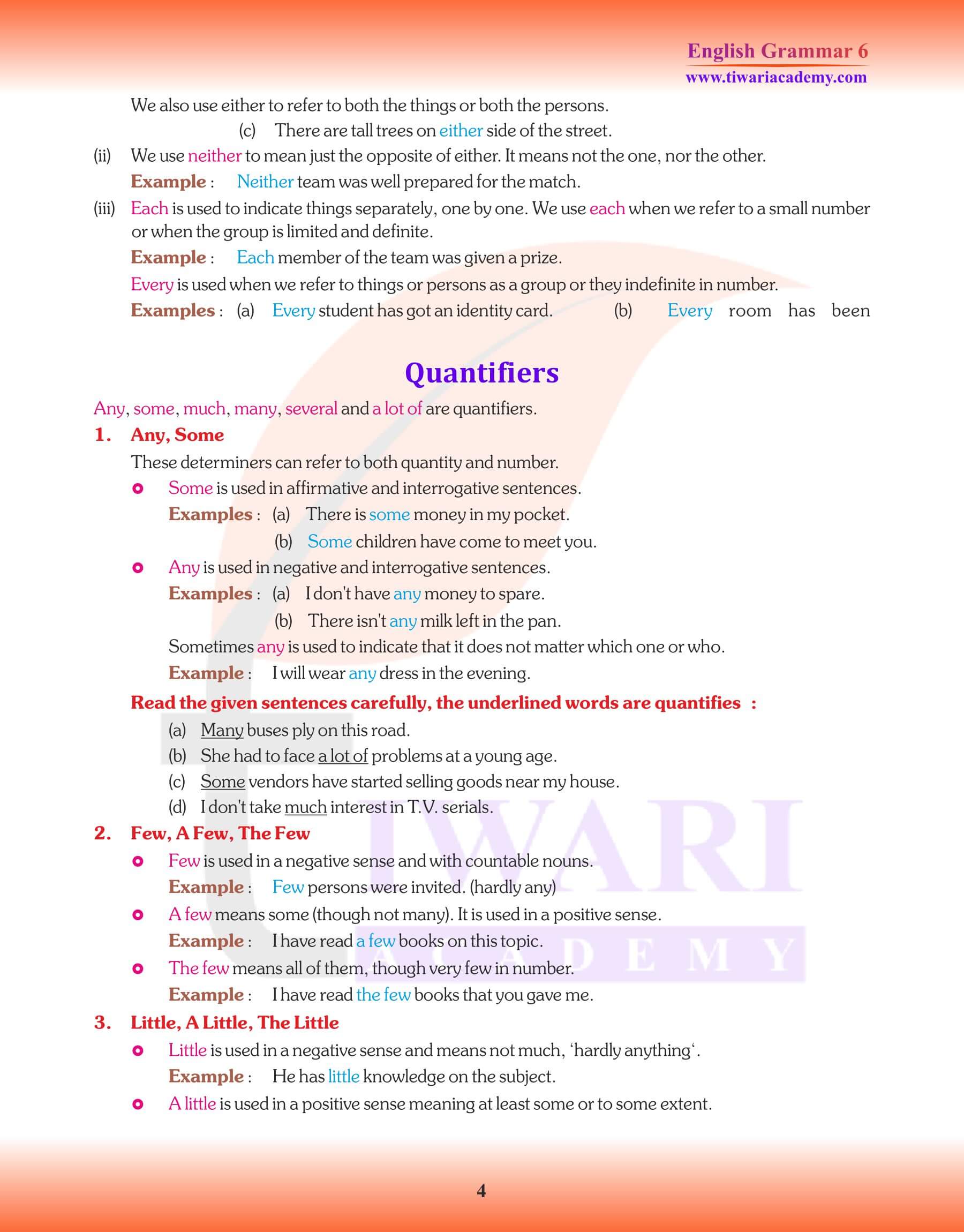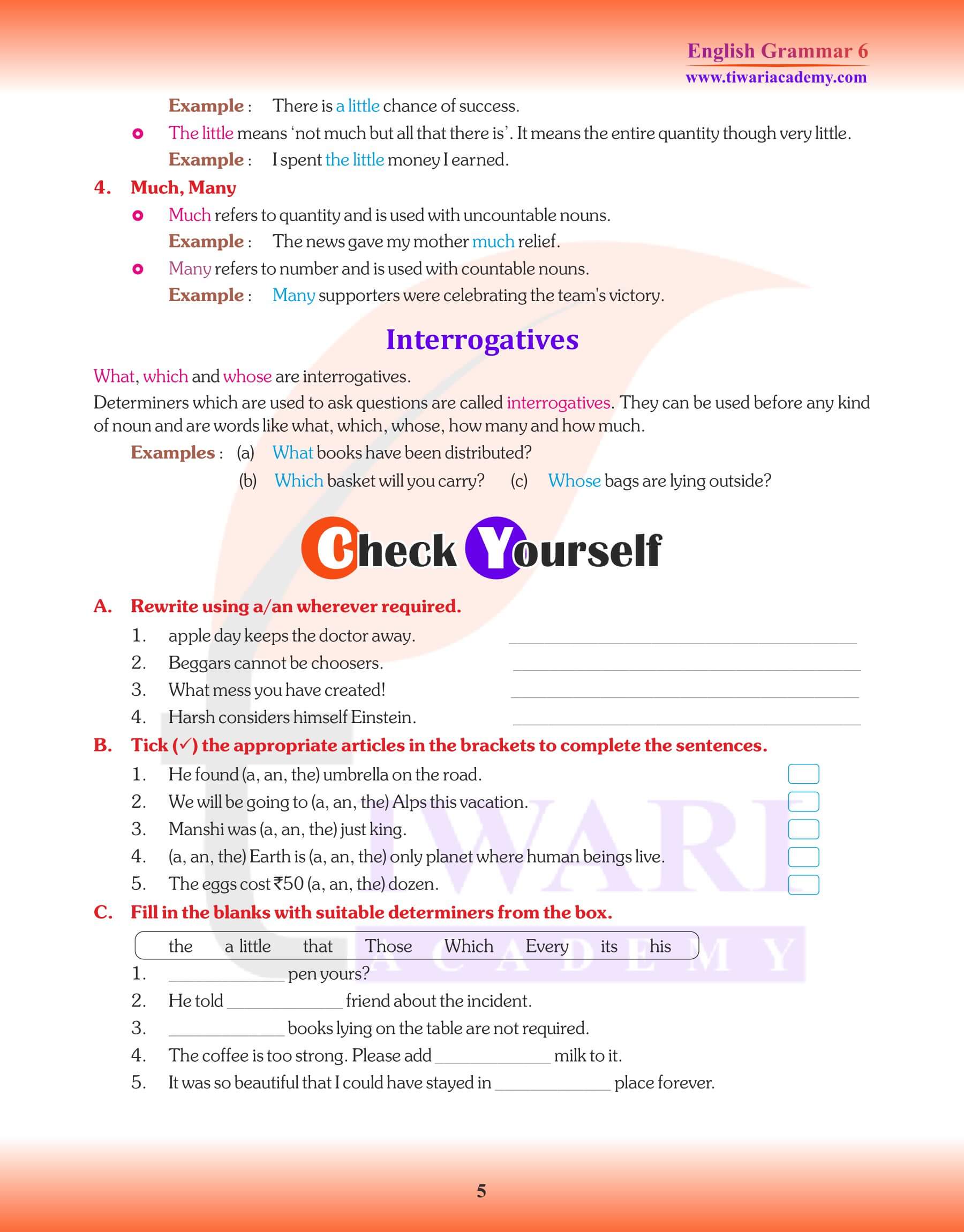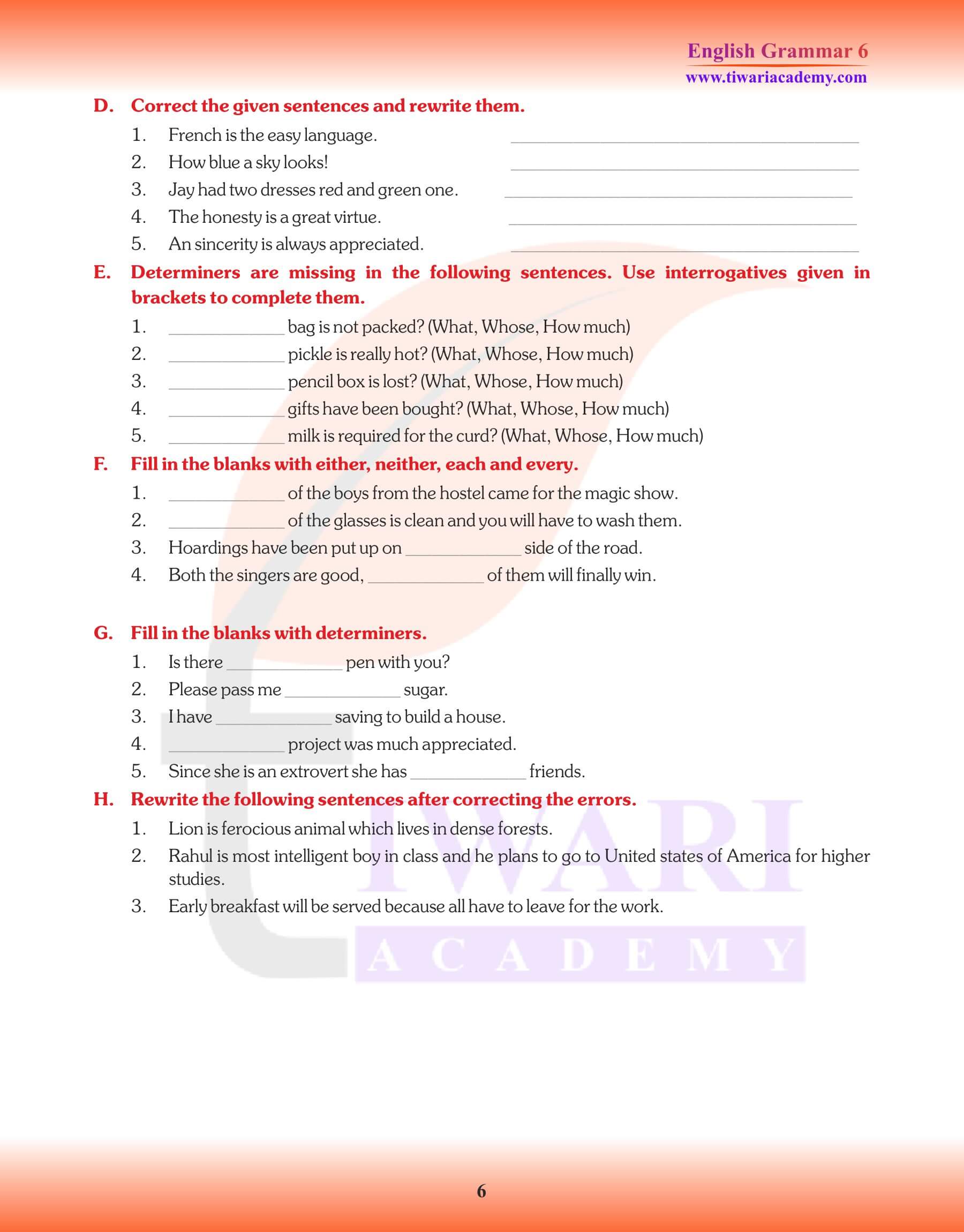The words which are used to fix or define or determine the nouns in some way or the other are called the Determiners. In Class 6 English Grammar Chapter 9: Determiners, we will learn the use of Articles, Possessive Determiners, Demonstrative Determiners, Numeral Determiners and Quantitative Determiners. This chapter describes each and every thing about determiners for grade 6 students. Solutions and contents are applicable for all boards who are following CBSE Curriculum or NCERT Textbooks. Not only in UP Board and MP Board, but the Rajasthan and Haryana board also using NCERT Books from academic session 2025-26. We will also learn the exceptions during using determinants. Words that begin with a vowel but have constant sound start with a. For example, a university, a unicorn, a useful receipt. Similarly, words that begin with consonant but have vowel sound start with an. For example, an hour, an honest woman, an heir.
Class 6 English Grammar Chapter 9 Determiners and its Kinds
Determinants and its Applications Explanation
| Class: 6 | English Grammar |
| Chapter: 9 | Determinants and its Applications |
| Study Material: | Course Book and Revision Notes |
| Academic Session: | 2025-26 |
Class 6 English Grammar: The Determiner and its Kinds
Contents related to Class 6 English Grammar Chapter 9: Determiners are given below. All the contents are prepared for the grade 6 students. Description of all kinds of determinants and its related examples are given in the form of contents and PDF file format.
Articles
Indefinite Articles: A and An are called Indefinite Articles while ‘the’ is called Definite Article. The choice between A or An is determined by sound.
- A is used before words beginning with a consonant sound.
A boy, a dog, a B.A., a unit, a union, a European, a one-rupee coin, a one legged man, such a one etc. - An is used before words beginning with a vowel sound.
an ant, an eye, an inkpot, an ox, an umbrella, an M.A., an S.D.O., an HMT, an hour, an heir, an honest etc.
The Definite Articles the
The is used with:
- Nouns that are unique.
The sun, the moon, the earth, the sky etc. - When a Singular Noun is used to represent the whole class.
The cow is a useful animal. The dog is a faithful animal. - Before an adjective to make it a Plural Noun.
The poor, the rich, the brave, the blind, the dumb etc. - Before an Adjective in the superlative deree.
The best, the tallest, the strongest, the most beautiful etc. - Before the names of directions.
The east, the north, the south, the west etc. - Before the ordinal numbers.
The first, the second, the third, the last, the next etc. - Before musical instruments.
The harmonium, the flute, the guitar, the violin, the drum, the piano etc.
The Definite Article with Proper Noun
As a general rule ‘the’ should not be placed before a Proper Noun, but the following exceptions may be carefully noted. The is used:
- before the names of seas, gulfs, group of islands.
The Indian Ocean, the Red Sea, the gulf of Maxico, the Andamans etc. - before the names of rivers, canals, lakes, straits.
The Ganga, the Thames, the Western Canal, the Dal Lake, the Palk Straits. - before the names of holy books.
The Gita, the Bible, the Quran, the Vedas etc. - before the Newspapers and Magazines.
The Tribune, the Times of India, the India Today etc. - before the names of ships, aeroplane, trains, buses.
The Vikrant, the Eagle, the Taj Express, the D.T.C., the Ashoka Emperor etc. - before the names of historical and famous buildings/events, days.
The Taj Mahal, the White House, the First World War, the Republic Day etc. - before the names of hotels, shops, workshops, factories and banks etc.
The Ashoka Hotel, The Taj Hotel, the Quality, the Jain Sweet Bhandar, the Chauhan Automobile, the Escorts, the Birla Mills, the State Bank of India, the Gurgaon Gramin Bank etc. - before the names of Political Parties and Organisations.
The Lok Dal, the Congress, the B.J.P., the Lions Club, the Sanatan Dharam Sabha, the Sharma Dramatic Club. - The names of religions and communities.
The Hindu, the Muslim, the Jain, the Hinduism, the Islam, the Jainism. - before the descriptive names of countries and provinces
The U.S.A., the U.S.S.R., the Punjab, the Deccan, the U.N.O., the U.P. etc.
Possessive Determiners
A Possessive Determiner is a word that shows possession and is followed by a noun. There are seven possessive determiners—my, our, your, his, her, its, their. Adjectives—my, our, your, his, her, its, their—known as Possessive Adjectives are now considered as Possessive Determiners.
| Possessive Determiners | Possessive Pronouns |
| This is my book. | This book is mine. |
| That is our school. | That school is ours. |
| This is your car. | This car is yours. |
| This is his cow. | This cow is his. |
| These are their caps. | These caps are theirs. |
Demonstrative Determiners
The determiners this, that, these and those in the following sentences point out which person or thing is meant. These are followed by nouns. So, they are called Demonstrative Determiners.
| Demonstrative Determiners | Pronoun |
| This school is ours. | This is our school. |
| These pencils are hard. | Whose pencils are these? |
| That sight is charming. | That is a charming sight. |
| Those fields are yours. | Those are your fields. |
Numeral Determiners
The determiners that are linked with numbers are called Numeral Determiners. They tell us how many persons or things are talked of. They are of three kind: Definite Numerals, Indefinite Numerals and Distributive Numerals.
Definite Numerals
Definite numerals tell us of exact number, like
- One, two, three …………..; called cardinal numbers
- First, second, third …………..; called ordinal numbers
- Once, twice, thrice …………..; called multiplicative numbers
- Single, double, one-third …………..; called number of frequency
Indefinite Numerals
Indefinite numerals do not tell us of an exact number like—some, many, few, all, several, certain, any, no, most etc.
- Are all men not equal?
- I have many friends.
- Some boys are absent today?
- He has no servant.
- Who is the next batsman?
- Most boys like to play.
- Is there any letter for me?
- I have few friends in this city.
Distributive Numerals
Distributive numerals refer to each one of a number.
- Each player has his own bat.
- India expects every man to do his duty.
- There are trees on either side of the road.
- Neither answer is right.
Quantitative Determiners
Quantitative Determiners tell us about the quantity or degree of a thing. They show how much a thing is meant. Formerly these determiners were taught as Adjectives of Quantity. They are much, little, no, none, some, any, all, whole, enough, sufficient, half etc.
- She showed much patience.
- We have had enough exercise.
- They ate some rice.
- He did not eat any bread.
- I spent all the money.
- She ate the whole leaf.
- You have no sense.
- A half kg. is equal to 500 gms.
Pre-Determiners
If two determiners occur together before a noun, the preceding determiner is called the
Pre-Determiners. In the following sentences, the words in italics are determiners because they are played just before their nouns. But the words in bold type have been used before the determiners. So, they are called Pre-Determiners.
- All the players were honoured by the Principal.
- All those girls will stage a dance show.
Ask your doubts on Tiwari Academy platform related to NCERT Textbooks Solutions or Exemplar Textbook and share your knowledge with your friends and other users through Discussion Forum. Contact us for help without any hesitation.
